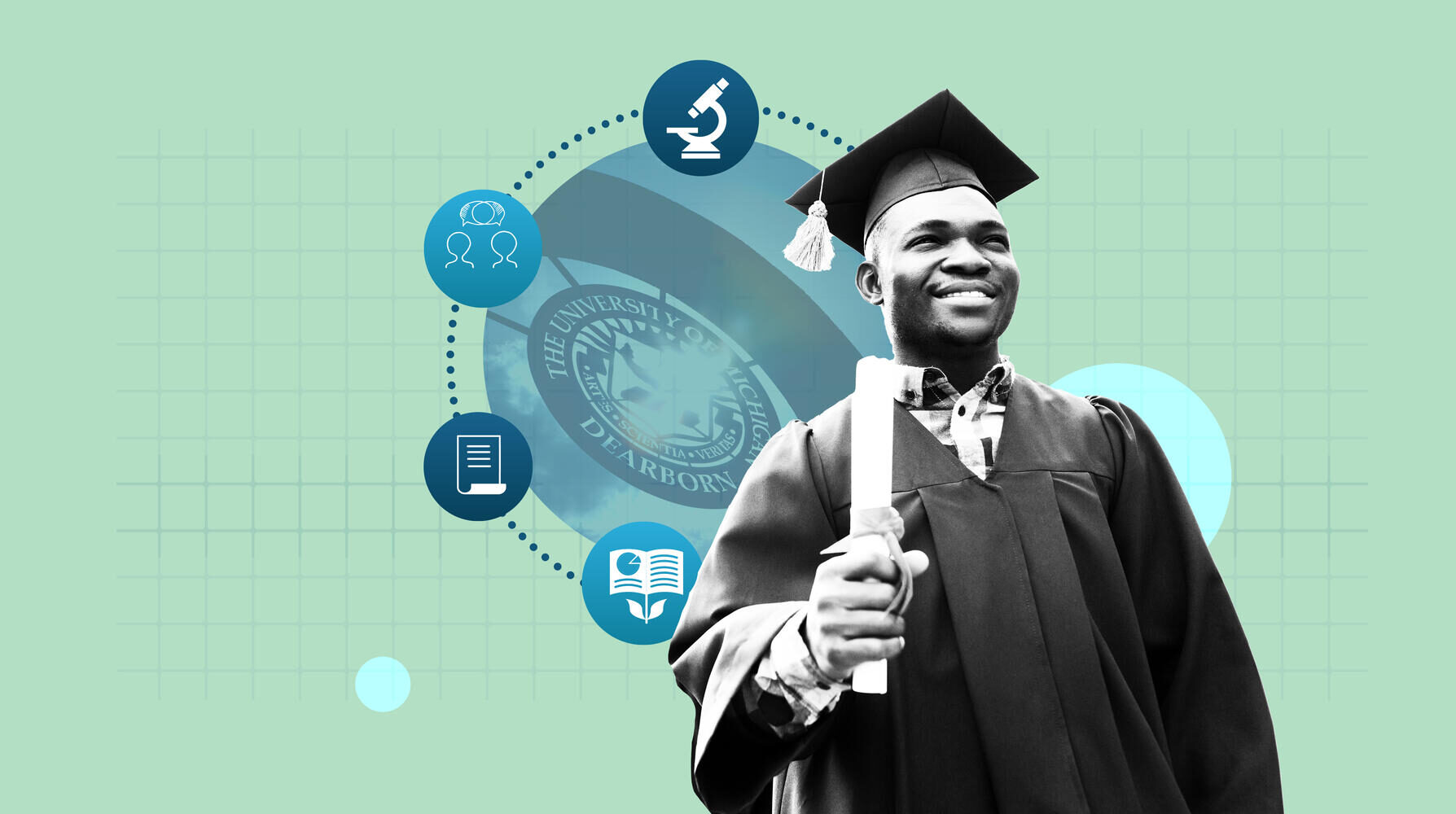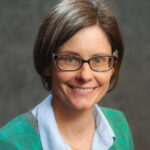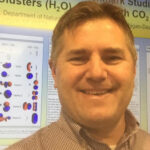
Graphic by Violet Dashi.
UM-Dearborn faculty noticed that talented students who struggled in introductory science and math courses — like Calculus I or General Chemistry — were less likely to go beyond the first year of college than those who did well.
Looking into that a little more, they discovered these students studying to go into a science, technology, engineering and mathematics (STEM) field were often Pell Eligible, which is a federal need-based funding for lower income families.
“First to second year retention rates for the first time in any college (FTIAC) Pell Eligible students in STEM majors lagged behind those of their non-Pell eligible counterparts on campus. Looking at the same populations, Pell Eligible students also had lower graduation rates,” Mathematics and Statistics Professor Joan Remski said. “Many of our students work, are responsible for family care, live in underserved areas and are first in their families to go to college. They want an education, but don’t have the time or the experience to work through a challenging course. We needed a plan to better support these students.”

So Remski, Biochemistry Professor Marilee Benore and Chemistry Professor Daniel Lawson created a STEM Scholars program — and the National Science Foundation (NSF) liked the approach. The team was awarded $1.44 million in NSF grants to carry out their vision.
“There are existing, proven interventions and high impact practices for STEM retention like conducting research, being part of a cohort, and attending supplemental instruction sessions. Those things are more accessible for students who don’t have competing priorities outside of their studies,” Benore said. “We wanted to adapt those practices to better fit with the needs of our commuter students who have a large number of outside responsibilities.”
Over the next three years, 56 STEM-focused undergraduate first-year students — 18 for the first two years and 20 for the third — will be selected to study together, have remote supplemental instruction, get tutors built into classes like Calculus I and General Chemistry, gain professional development through optional workshops, and conduct research through a Research Rotations program that’s time-flexible.

The STEM Scholars, which will begin its first cohort in Fall 2022, must be Pell eligible and have a minimum 3.0 high school GPA, placement into campus’ Calculus I or higher, and a major in a STEM-focused program. Included majors are Biological Sciences, Biochemistry, Computer & Information Science, Engineering, Electrical Engineering, Industrial and Systems Engineering, Mechanical Engineering, Computer Engineering, Mathematics, Environmental Science, Bioengineering and Chemistry. Majors were chosen based on industry need, student interest and where in the STEM pipeline UM-Dearborn loses the most students.
Students who qualify and are accepted into the STEM Scholars program will be awarded grants and scholarships toward tuition and fees for four academic years as long as they remain in one of the selected STEM majors and maintain a 2.5 GPA. This means through a combination of the NSF-funded grant and other federal and institutional grant funding, they can essentially earn a STEM undergraduate degree for free.
The STEM Scholars program is a cross-campus collaboration. In addition to Remski, Benore and Lawson, the project management team includes Computer and Information Science Professor Brahim Medjahed, Electrical and Computer Engineering Associate Professor Samir Rawashdeh, Mathematics Associate Professor Yunus Zeytuncu, Computer and Information Science Assistant Professor Anys Bacha, Mathematics Associate Professor Alan Wiggins and Victoria J Bigelow, evaluation coordinator in U-M’s School of Education. Enrollment Management and Business Affairs are also instrumental with the program.

Lawson said STEM education is important in all aspects of life and looks forward to welcoming the first class of STEM Scholars. Program applications will be available online in December.
“What part of today’s society doesn’t deal with STEM? It’s the basis of all modern technology and culture. No matter what you do, math and science will be a part of it,” he said. “The more opportunities we can give so that these fields accurately represent all people — not just those who can afford specialized education — the better off we will all be.”
Since most of UM-Dearborn’s students remain in the area following graduation, focusing efforts on engaging these students may lead to greater contributions to Michigan’s much-needed STEM workforce. While many local jobs are centered around the auto industry, there are also opportunities in manufacturing, computing, data analysis and health-related fields.
Will having additional flexibility and built-in resources make a difference for campus’ students? The STEM Scholars project team thinks so — and they plan to prove it. At the end of each year during the six-year NSF grant’s funding, they will report to the foundation on how the new practices are impacting student success.
Remski said the gap in educational attainment among students with resources and those without is not just a UM-Dearborn problem — it’s a universal one.
Remski, Benore and Lawson hope by tailoring high-impact practices to a commuter campus that serves many first-generation and underrepresented students, there’s discovery of effective retention methods that other institutions can implement. The Center for Education Design, Evaluation, and Research (CEDER) at the University of Michigan School of Education will serve as the external evaluator on the project.
“We will measure the impact of these activities in terms of their ability to increase student participation, as well as evaluate the effectiveness,” Remski said. “Hopefully, if the practices show they are effective, more resources can be allocated to closing the retention and graduation rate gap that we are currently seeing. I’m excited to learn what makes the most difference for our students.”
In the short-term, they’ll tackle the first-year retention rate gap seen between Pell-eligible and non Pell eligible students. Their goal is to see an 85% retention among the STEM Scholars. The long term plan? To close the graduation gap and have UM-Dearborn Wolverines in low-income situations enter professionally fulfilling STEM careers that create economic stability for themselves and their families.
“We know our students are hard workers. We know they are talented. We know they want the best for their families. And they want educational opportunities, but sometimes life gets in the way,” Benore said. “We want to see them succeed and you get results by staying student centered. And that’s exactly what this plan is.”


